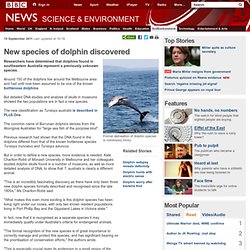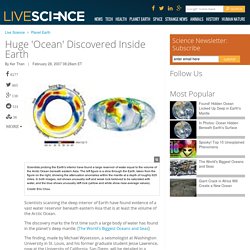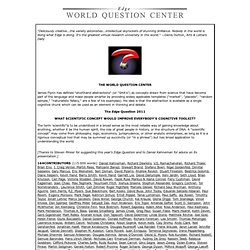

We are about to find out if our universe really is a hologram. What could be the most important scientific experiment of our lifetime is about to begin.

The so-called Holometer Experiment at the Fermi National Accelerator Laboratory aims to determine whether our perception of a three-dimensional universe is just an illusion. Do we actually live on a 2D plane, as a holographic projection? There is a well-established theory that states we are indeed living in a hologram, with a pixel size of about 10 trillion trillion times smaller than an atom. This has certain implications, some of which are quite sinister, even unspeakably horrific. Is 'genius' a dirty word? 21 September 2011Last updated at 11:06 By Kate Dailey BBC News Magazine Extraordinary individuals: Albert Einstein, Marie Curie, Ludwig van Beethoven The annual awarding of MacArthur Foundation grants means that another 22 people are going to find themselves called "genius".

But is the title a blessing or a curse? According to the MacArthur Foundation, annual fellowships are awarded to outstanding individuals who show talent, originality, and dedication in all fields. They must also be citizens of, or resident in, the United States. Online gamers crack AIDS enzyme puzzle. Solve Puzzles for Science.
New species of dolphin discovered. 15 September 2011Last updated at 10:16 Formal delineation of dolphin species is notoriously tricky Researchers have determined that dolphins found in southeastern Australia represent a previously unknown species.

Supercomputer predicts revolution. 9 September 2011Last updated at 15:57 Sentiment mining showed a sharp change in tone around Egypt ahead of President Mubarak's ousting Feeding a supercomputer with news stories could help predict major world events, according to US research.

A study, based on millions of articles, charted deteriorating national sentiment ahead of the recent revolutions in Libya and Egypt. While the analysis was carried out retrospectively, scientists say the same processes could be used to anticipate upcoming conflict. The system also picked up early clues about Osama Bin Laden's location. Kalev Leetaru, from the University of Illinois' Institute for Computing in the Humanities, Arts and Social Science, presented his findings in the journal First Monday. Mood and location The study's information was taken from a range of sources including the US government-run Open Source Centre and BBC Monitoring, both of which monitor local media output around the world.
Predicting trouble. Huge 'Ocean' Discovered Inside Earth. Scientists scanning the deep interior of Earth have found evidence of a vast water reservoir beneath eastern Asia that is at least the volume of the Arctic Ocean.

The discovery marks the first time such a large body of water has found in the planet's deep mantle. [The World's Biggest Oceans and Seas] The finding, made by Michael Wysession, a seismologist at Washington University in St. Louis, and his former graduate student Jesse Lawrence, now at the University of California, San Diego, will be detailed in a forthcoming monograph to be published by the American Geophysical Union. Looking down deep The pair analyzed more than 600,000 seismograms — records of waves generated by earthquakes traveling through the Earth—collected from instruments scattered around the planet.
They noticed a region beneath Asia where seismic waves appeared to dampen, or "attenuate," and also slow down slightly. "That is exactly what we show here," Wysession said.
Intel Solar-Powered Computer Processor Offers Glimpse Of Future. SAN FRANCISCO -- A solar cell the size of a stamp.

That's all Intel Corp. researchers needed to power a computer processor that could hold a tantalizing vision for the low-power chips of the future. The company showed off the feat this week at its annual developer conference in San Francisco. The achievement was less about the fact the chip ran on solar power and more about how Intel employees were able to create a chip that ran on little more than the power needed to turn on its transistors, the so-called "threshold" voltage. Intel's chief technology officer, Justin Rattner, said the experimental processor was 5 times more energy-efficient than today's processors. But he emphasized that it is nowhere near ready for prime time. THE WORLD QUESTION CENTER 2011. "Deliciously creative...the variety astonishes...intellectual skyrockets of stunning brilliance.

Nobody in the world is doing what Edge is doing. It's the greatest virtual research university in the world. " —Denis Dutton, Arts & Letters Daily James Flynn has defined "shorthand abstractions" (or "SHA's") as concepts drawn from science that have become part of the language and make people smarter by providing widely applicable templates ("market", "placebo", "random sample," "naturalistic fallacy," are a few of his examples). His idea is that the abstraction is available as a single cognitive chunk which can be used as an element in thinking and debate.
The Edge Question 2011 The term 'scientific"is to be understood in a broad sense as the most reliable way of gaining knowledge about anything, whether it be the human spirit, the role of great people in history, or the structure of DNA. 164CONTRIBUTORS (115.000 words): Daniel Kahneman, Richard Dawkins, V.S. Paul Jáuregui ... [Continue] We All Get Shorter As We Age, Research Confirms. You're not just imagining it -- you do get shorter as you get older, new research reveals.

Research has shown that most people shrink from age 30 to 70, with men getting about an inch shorter and women getting about two inches shorter, the Early Show reported. And when people hit age 80, men and women lose another inch on top of that. After age 40, it's not uncommon to start getting just a little bit shorter. But shrinking too much or too fast could be a sign of health problems, research shows. The Wall Street Journal reports research that shows men age 70 or older who shrink more than 2 inches in two years are 54 percent more likely to break their hip bone than men who don't shrink as much as fast.
AARP also reported that men who, over a 20-year-period, lose at least 1.2 inches off their height have a 46 percent higher risk of suffering heart disease an a 64 percent higher risk of dying, compared with men who lose 1.2 inches over a 30- to 40-year time span. Lab chimps see daylight for first time in 30 years. New emotion detector can see when we're lying. 13 September 2011Last updated at 13:26 By Hamish Pritchard Science Reporter, Bradford. NASA awakens its humanoid robot at international space station. Scientists chasing a particle they believe may have played a vital role in creation of the universe indicated last week that they were coming to accept that it might not exist after all.

But they stressed that if the so-called Higgs boson turns out to have been a mirage, the way would be open for advances into territory dubbed “new physics” to try to answer one of the great mysteries of the cosmos. The CERN research center, whose giant Large Hadron Collider has been the focus of the search, said it had reported to a conference in Mumbai that possible signs of the Higgs noted last month were now seen as less significant.